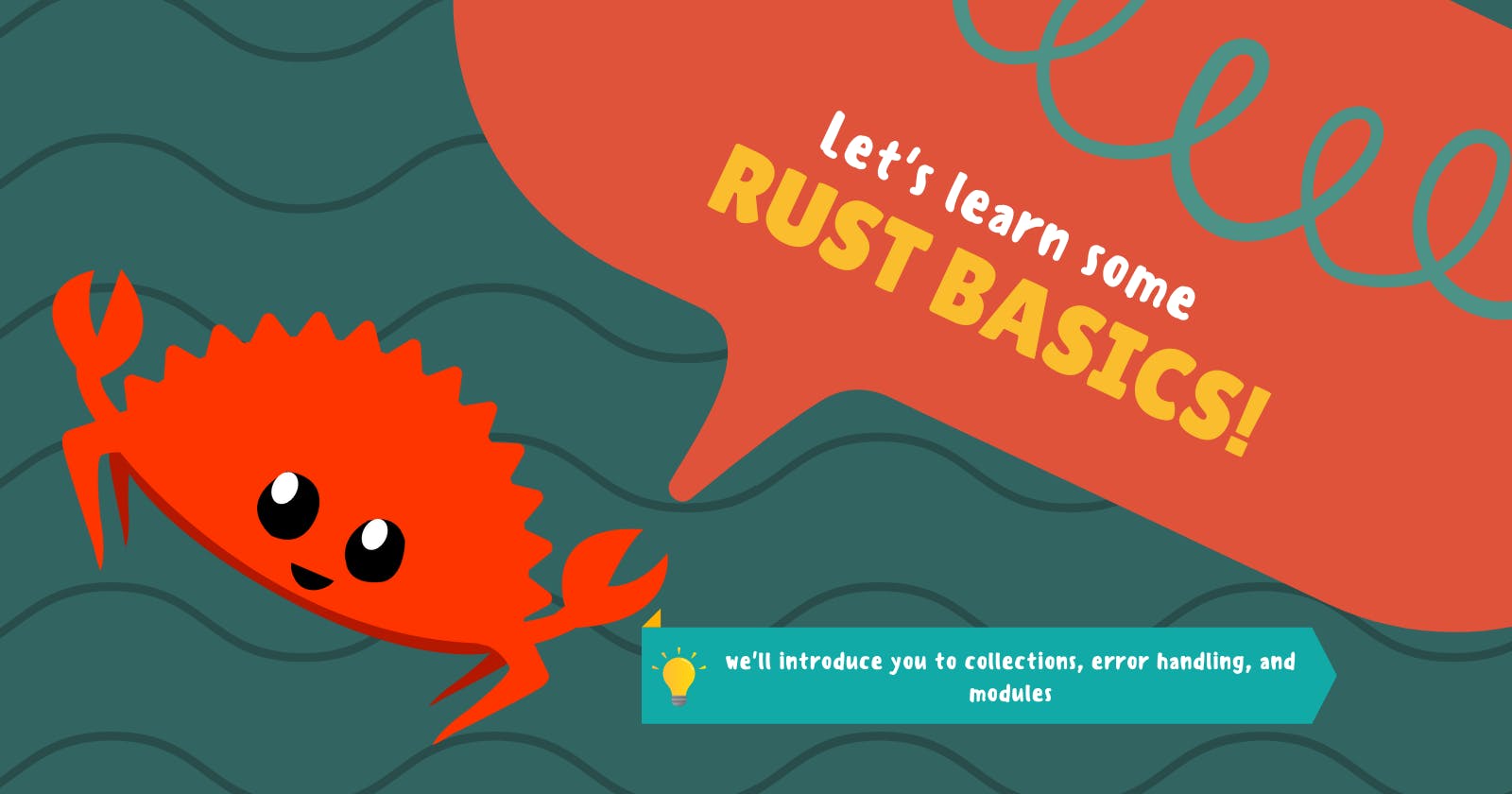Rust for Beginners: Making New Friends with Collections, Error Handling, and Modules
Introduction
Welcome back, fellow Rustaceans! We're thrilled to see you again after our first friendly introduction to Rust. Now that you've got the basics down, it's time to expand your Rust horizons and explore some features that will help you write more efficient and organized code. In this cozy post, we'll introduce you to collections, error handling, and modules. So, let's get started on this exciting adventure together!
Collections: A Cozy Way to Organize Your Data
In Rust, there are three main collection types that act like helpful little containers for your data: vectors, strings, and hash maps. These collections allow you to store and manage multiple values neatly and efficiently.
Vectors
Vectors are like magical, resizable arrays that can store values of the same type. To create a vector, use the vec! macro:
fn main() {
let mut numbers = vec![1, 2, 3];
numbers.push(4);
numbers.push(5);
println!("{:?}", numbers);
}
Strings
Strings in Rust can be a bit of a puzzle at first. There are two types: &str (string slices) and String (growable, heap-allocated strings). Here's an example of creating and modifying a String:
fn main() {
let mut message = String::from("Hello, ");
message.push_str("World!");
println!("{}", message);
}
Hash Maps
Hash maps are like treasure chests that store key-value pairs, providing quick access to their treasures by key. Here's an example of creating and using a hash map:
use std::collections::HashMap;
fn main() {
let mut scores = HashMap::new();
scores.insert("Team A", 10);
scores.insert("Team B", 8);
println!("{:?}", scores);
}
Error Handling: Embracing the Little Surprises
Rust has a unique way of handling errors using the Result and Option enums. These types make it easy to handle surprises and unexpected situations in a clear and concise manner.
Result
The Result enum has two variants: Ok (for successful results) and Err (for error results). Functions that can return errors typically use the Result type. Here's an example of using the Result type to handle errors when reading a file:
use std::fs::File;
use std::io::Read;
fn main() {
match read_file_contents("non_existent_file.txt") {
Ok(contents) => println!("File contents: {}", contents),
Err(e) => println!("Oops! An error occurred: {}", e),
}
}
fn read_file_contents(filename: &str) -> Result<String, std::io::Error> {
let mut file = File::open(filename)?;
let mut contents = String::new();
file.read_to_string(&mut contents)?;
Ok(contents)
}
Option
The Option enum has two variants: Some (for values) and None (for null values). Functions that can return null values typically use the Option type. Here's an example of using the Option type to handle null values:
fn main() {
let name = find_username(1);
match name {
Some(username) => println!("Username: {}", username),
None => println!("Aw, shucks! We couldn't find that user."),
}
}
fn find_username(id: u32) -> Option<String> {
if id == 1 {
Some(String::from("Alice"))
} else {
None
}
}
Modules: Organizing Your Code Like a Librarian
Modules are like friendly librarians that help you organize your Rust code into separate, logical units. They help you manage complexity, improve code reusability, and keep things neat and tidy. Let's explore how to create and use modules in Rust.
Defining Modules
To create a module, use the mod keyword, followed by the module name and a block containing the module's contents. Here's an example of a simple module containing a function:
mod greetings {
pub fn hello() {
println!("Hello, World!");
}
}
fn main() {
greetings::hello();
}
Nested Modules
Modules can be nested within other modules, like a series of friendly nesting dolls. This can help you further organize your code into a tidy, hierarchical structure:
mod greetings {
pub mod english {
pub fn hello() {
println!("Hello, World!");
}
}
pub mod spanish {
pub fn hello() {
println!("Hola, Mundo!");
}
}
}
fn main() {
greetings::english::hello();
greetings::spanish::hello();
}
Using External Modules and Crates
Rust's package manager, Cargo, makes it a breeze to use external modules and packages (called "crates") in your projects. To use an external crate, add it to your Cargo.toml file and then use the use keyword to import the module into your code. Here's an example using the popular serde crate:
# Cargo.toml
[dependencies]
serde = "1.0"
serde_json = "1.0"
use serde_json::{json, Value};
fn main() {
let data: Value = serde_json::from_str(r#"{"name": "Alice", "age": 30}"#).unwrap();
println!("Name: {}", data["name"]);
}
Conclusion
Way to go! You've now taken the next step in your Rust journey by learning about collections, error handling, and modules. We hope this friendly and approachable post has helped you gain a deeper understanding of Rust and its capabilities.
As you continue to explore Rust, remember that practice makes perfect, and a little experimentation can go a long way. Try building small projects and playing around with the concepts you've learned. And, as always, don't hesitate to seek help from the warm and welcoming Rust community, which is always happy to provide guidance and support.
Stay tuned for our next blog post, where we'll delve even deeper into Rust's features and best practices. Until then, happy coding!

